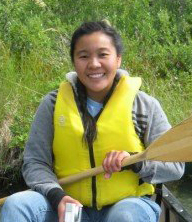
Flying out of Oakland anytime soon? If so, check in a little early and witness the work of ESPM Graduate Student Misha Leong in action! Misha collaborated with the Oakland Museum of California as guest curator of Bees, an off-site exhibition on view in the Oakland International Airport. The exhibit takes a look at the wildly diverse and intricate world of one of the most important creatures to human culture and agriculture. On view at the airport through May 2nd, the interactive exhibit explores the significance of bees to California's agricultural industry, honey bees and Bay Area beekeeping, the diversity of California bee species, and citizen science groups that study local pollinators.
Bees also features the beautiful photos of CNR alumnus Rollin Coville, who earned a Ph.D. in Entomology from UC Berkeley in 1978.
We recently caught Misha in the halls of Mulford and got her thoughts on working with OMCA, her experiences in ESPM, and her passion for science education and outreach. How did you get connected with OMCA and the opportunity to curate an exhibit?

I grew up in Oakland and have always loved the OMCA. When I happened to meet one of the natural sciences curators at a conference, I let him know I would be interested to help in any way I could. Since they were interested in doing an exhibit on bees and that is one of my areas of expertise, they thought of me.
Where did you find the content for the exhibit? How long did it take to plan?
I knew a lot of the information about pollinators and native bees already because of my research interests, but I learned a lot more about honey bees and beekeeping through this project. I went to the Mt. Diablo Beekeepers Association and Alamada County Beekeepers Association meetings, which were really fun events!
What are some of the things viewers of the exhibit can learn about bees?
The Bee Exhibit is divided into three parts at the airport, focusing on pollination, honey bees & beekeeping, and California's native bees. There are microscopes in two sections so viewers can get a closer look at the bees. Visitors can also try working with real beekeeping tools and play a guessing game called "Is it a Bee?"
What other interesting projects have you been involved with while at Berkeley?
I've really enjoyed getting to be a part of the Berkeley Natural History Museum's CAL:BLAST and GK-12 programs. With CAL:BLAST I got to work with a team of elementary school teachers and helped them develop their life science skills. With GK-12, I worked with 7th grade students at Mira Vista in Richmond, and we explored different aspects of California biodiversity and science skills.
You're interested in science education and outreach. Why do you think it is so important?
To me, one of the biggest environmental problems is the growing disconnect that many people in cities have with the natural environment. Having an informed and invested public is key in creating changes in policy decisions and behavior. On a more personal scale, I believe that all Californians should have the opportunity to learn about and be proud of our state's rich natural history. Since it tends to not be taught formally in school and it is not something that is easy to learn in isolation, I think that those of us with that knowledge have a responsibility to share it.
Congratulations on graduating this spring! What stands out about your last 6 years in ESPM?
I came into ESPM having been based in biology departments for my undergraduate and masters programs. I was confused at first by the combination of so many types of research that happen within our department, but I've come to really value this diversity. It's helped me to think about my own research more broadly.
---
Catch Misha's finishing talk, entitled “Bees in a Changing World: How Land Surface Phenology, Bee Community Distributions, and Pollinator-plant Interactions are Impacted by Urbanization and Agriculture,” (and finishing talks by other graduating ESPM students!) at the ESPM Graduate Research Symposium on May 2nd.
